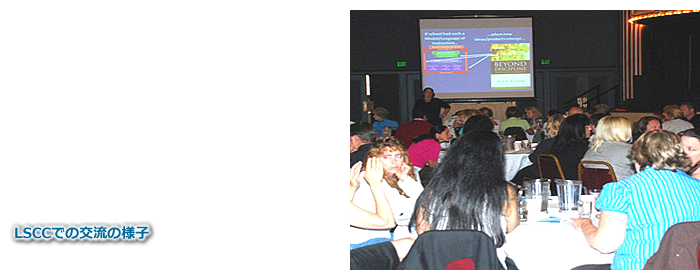
「Leadership Santa Cruz County - LSCC」
Leadership Santa Cruz County (LSCC) was originally founded in 1985 by the Santa Cruz Chamber of Commerce with the intention of offering members the opportunity to meet and exchange ideas on how to solve the pressing issues facing the community by bringing together people from all levels of society, regardless of age, ethnicity, occupation, or how long they have lived in the community. The LSCC provides the opportunity to meet members of the community that they normally do not have a chance to meet.
The origin of the LSCC dates back over 30 years. At the time, in the 1980s, the U.S. was in the middle of a recession that seemed to drag on over a long time the community needed to find ways to maintain economic stability.
Made up of residents in the area of Santa Cruz, regardless of race, sex, age, occupation, and social class, the LSCC represents a wide cross section of the community. It was agreed by all that in order to create their own future and be in control of their destiny they needed to cultivate leaders who could creatively resolve the problems they faced and build consensus.
Gradually it was agreed to move forward and now involves five chambers of commerce in the area, corporate sponsors, as well as NGOs. The LSCC has produced up to 1,000 graduates to date.

About LSCC and Their Objectives。
- Nurtures talent to create regional leaders to build the local future plan.
- Brings together long time members and new members of the community regardless of social status, ethnicity, gender, occupation that properly reflects the broad diversity of the community in order to better solve the various issues facing the community and enjoy taking part in shaping the future of their community by exchanging ideas and working in collaboration with others for the benefit of all citizens in the region.
- Of the past 1000 graduates, many have taken positions in government, corporations, NPOs, education, and are active in putting on forums, working cooperatively on various programs, and exchanging ideas at 'fireside' talks.
- Program content over the last 23 years is also constantly evolving due to the regular follow up and studies of graduates.
- In an actual class participants from diverse backgrounds will attempt to solve contemporary issues by taking them one by one and dissecting them. After providing detailed descriptions of the problems to be solved they hold panel discussions with experts in the issues being discussed and do case studies on the various debated solutions put forward.
- Among these case studies are programs including programs that bring together long time elderly residents with young new residents in order to collaborate on solving local problems and thereby fostering learning and experiences not normally experienced by the local residents which in turn drives the community development process forward in a positive way.
Recent Project Examples
- Sends out youth leaders into the community
- Supports and brings out the power of local volunteers and NPOs
- Fosters improvements and better programs for the LSCC
- Works on solutions to suburbanization, and the so-called 'Donut Phenomenon'
- Develops crisis preparedness and plans for unpredictable business cycles
- Researches what can be done for the community to deal with youth crime and delinquency
- Finds and encourages leaders in the region to become city and county commissioners

